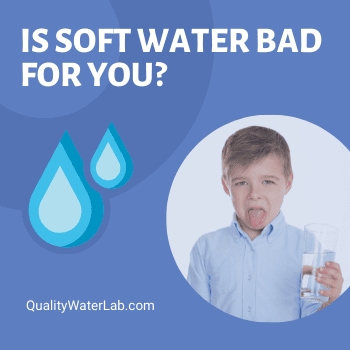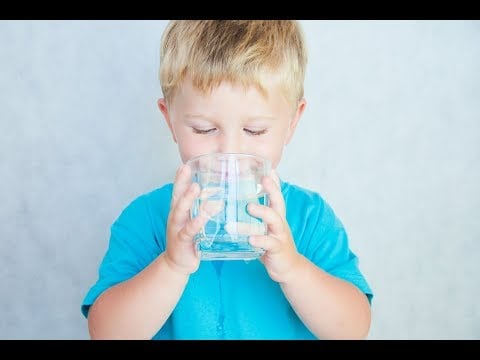
Is soft water safe to drink? The simple answer is yes. However, the complicated truth behind this question has a lot more to it than a “yes” or “no.”
We all know that water can be full of harmful chemicals and other pollutants if we don’t take steps to cleanse our drinking supply; however, what’s actually in your tap water? And how safe is it?
In this article, we are going to do our best to get through all of the technical jargon of whether or not drinking softened water is bad in the simplest way possible.
So sit back and relax and read on.
Key Takeaways:
- Soft water is generally safe to drink as it does not contain any harmful chemicals or compounds.
- It’s free of contaminants and minerals like magnesium and calcium, which can give water a bitter or unpleasant taste.
- Soft water is recommended for people who have difficulty digesting and absorbing minerals present in hard water, such as those with sensitive digestive systems.
What is Softened Water?
Water can be considered “soft” when it has been treated with a water softener. This treatment process removes hardness minerals, such as calcium and magnesium, from the water by replacing them with sodium or potassium.
The softened water is often said to be more gentle on fabrics, skin, and hair; however, this claim is contested by some.
Why Do We Soften Water?
The main reason a household would choose to soften their water is for health reasons. Hard water can cause dry skin and hair, damage clothes, clogged pipes, scale build-up on dishes or appliances, even digestive issues from the high mineral content in some cases.
In fact, The US Geological Survey found over 85% of Americans have hard water.
How Do We Get Soft Water In Our Homes?
There are a few ways to get soft water in your home. You can have a salt-based water softener installed, or you can use a water conditioner.
Salt-Based Water Softeners
The Water softening process uses salt (sodium chloride) to regenerate the resin beads in the system and remove hardness minerals from the water. The salt is added to a brine tank and the water softener runs through a back-washing process that flushes the salt and minerals down the drain.
However, be sure to check with your local building department to see if it’s okay to use a salt-based system. Some cities and towns have laws banning a salt-based water softener due to the fact of excess salt discharged in the sewer drain causing environmental issues.
This leads us to why a water conditioner might be right for you as a solid option moving forward.
Water Conditioners
A water conditioner does not use salt, but it does require periodic maintenance in order to keep it working properly. A water conditioner uses an electronic device to remove hardness minerals from the water. This process is known as “ion exchange” and it works by exchanging salt ions for calcium or magnesium ions in your water supply.
Water conditioners do not require salt, but they use salt depending on how hard your tap water is, so you will need to check with a professional about which salt type to use.
How Are the Two Different from One Another?
Salt-based water softeners add salt, or sodium ions, into your system which regenerates resin beads inside the unit and remove hardness minerals from the water supply; this is known as “ion exchange.” A salt-based system has a brine tank where salt is added to the water softener and runs through a back-washing process that flushes the salt and minerals down the drain.
Water conditioners use an electronic device to remove hardness minerals from the water which is known as “ion exchange.” A water conditioner does not require salt, but it can depend on how hard your tap water is, so you will need to check with a professional about which salt type to use.
Which Water Softener Is Better for My Home?
This answer can be difficult to determine as it depends on your specific needs and preferences. If you are looking for something that is low-maintenance and does not require salt, then a water conditioner may be a better option for you. However, if you are looking for something that is more durable and can handle a higher water hardness level, then a salt-based system would be the best choice.
At the end of the day, it is important to do your own research and consult with a professional who can help you make the best water softening decision for your home.
Is Salt-Based Water Safe to Drink?
This question may come up if salt is not something you are used to consuming, or you have concerns about salt intake in general. When it comes down to the issue of salt vs water hardness, a salt-based water softener will be more effective at removing the minerals from your water. However, if salt-based systems are not for you, a water conditioner will also work at removing hardness minerals from your water supply.
Both salt-based and water conditioner systems use salt to regenerate the resin beads; this is what helps remove the hardness minerals from your water. The amount of salt that is used in salt-based systems is typically not enough to have a significant effect on your salt intake.
So, using salt-based water softeners will not be unsafe if you are concerned about salt intake from the system.
Does Soft Water Taste Salty When Drinking?
This is a common question that people have about salt-based water softeners and it’s true, drinking softened water does have a different taste due to minerals that are removed. However, water softeners use sodium bicarbonate (not table salt – which is sodium chloride) to regenerate the resin beads; this is what helps remove the hardness minerals from your water.
Potassium chloride is also an option for water softeners, but it is not as common because it has a bitter aftertaste.
If you are still unsure about the taste of softened water, try doing a taste test with both cold and hot water to see if there is a difference.
What Other Choices Do We Have?
As previously mentioned, when it comes to the issue of salt vs water hardness, a salt-based system will be more effective at removing minerals from your water. However, installing a POI reverse osmosis system could also be a good option. A reverse osmosis system can remove up to 99% of the minerals in water supply, so it will take out any hardness in your tap water.
Reverse osmosis systems are typically more expensive than salt-based or conditioner systems, but they work well at removing all types of contaminants from your home. The only downside to a RO system is that hard water is tough on the membrane, which can decrease the lifespan of this type of system. However, reverse osmosis systems are typically pretty durable and will last for years if you maintain them regularly.
Top FAQ’S
Some people say that drinking softened water tastes a little different than drinking regular tap water, but most people cannot tell the difference.
The amount of salt used to soften drinking water depends on the size and type of purification system installed in your home. For example, a standard 40 gallon per day reverse osmosis system uses approximately 60 lbs of extra fine grain (0–300 micron) salt per month.
You should only have to add salt to your drinking water softener when the indicator light tells you that it is time to do so. This usually happens every few months, depending on how much water you use.
You should only use extra fine grain (0–300 micron) salt in your drinking water softener. This is because the smaller grains are less likely to clog the system.
 134 people found this helpful. Was this guide helpful to you?
134 people found this helpful. Was this guide helpful to you? 


